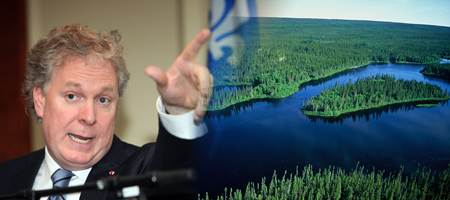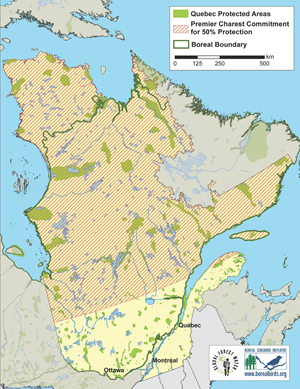
Quebec Premier Jean Charest and the boreal forest.
Credits: Charest: © Hans Westerling (via Flickr); Boreal: © Garth Lenz
The Premier of Quebec, Jean Charest, gave his long-anticipated Inaugural Address on Wednesday. For the majority of us living outside of Quebec most parts of the speech wouldn’t have been too relevant to our daily lives (things like education and infrastructure), however there was a part of the speech devoted to a subject that could have far reaching global impacts, including some that may affect you.
In 2008, Jean Charest announced that the province intended to protect at least 50% of its northern, or “boreal”, forest from development. This area—larger than France—is mostly intact and still supports abundant populations of wildlife. The boreal forest stores and sequesters staggering amounts of carbon, which means that folks like you and I will benefit from the natural climate mitigation the future protected regions provide. It is also home to large numbers of migratory birds that frequently winter in or pass through southern Canada and the United States along their migratory routes, including some that might pass through your area, like Cape May Warblers, Fox Sparrows, Blackpoll Warblers, American Black Ducks, Dark-eyed Juncos, Buffleheads, and Greater Yellowlegs to name just a few.

The American Black Duck is one of many boreal-breeders in Quebec.
Credit: Jeff Nadler
But this promise was, up until recently, being doubted by some. While the plan had never been dropped, a series of political scandals had put it lower in the pecking order in their agenda, and some felt a change in government leadership could mean an end to the vision. In addition, some bureaucrats had mentioned the possibility of doing a “mirror approach” in potential legislation, which would essentially only match each hectare/acre of development with one of conservation. But there was no scientific justification for this approach.
Luckily, Premier Charest renewed his commitment in his speech, allowing for no doubt about his intentions to protect at least half of the forest permanently from development:
"The potential of Northern Quebec is huge in terms of energy, mining and tourism. This Plan, which will be implemented in partnership with First Nations and Inuit, the investment of billions of dollars and creating tens of thousands of jobs. It will be in compliance with sustainable development: long term 50% of the territory north of the Plan will be devoted to purposes other than industrial, and intended for environmental protection and preservation of biodiversity, "said Mr. Charest in a statement.
Our colleague Mat Jacobson of the Pew Environment Group’s International Boreal Conservation Campaign issued a statement supporting this approach, which we agree with wholeheartedly:
"We are pleased that Mr. Charest reaffirmed a steadfast course for Quebec's future, and has embarked upon a bold new model for conservation of the boreal forest. It is our hope that under his leadership, the Plan Nord will become a global example for conservation, sustainable development, and respect for aboriginal people and cultures.”
"Today Mr. Charest has upheld his principles. If Plan Nord is executed correctly—using scientific principles and working with aboriginal partners—Quebec could leave a lasting legacy for Canada, open doors to increased economic opportunity, and provide a global model for other nations to follow."


